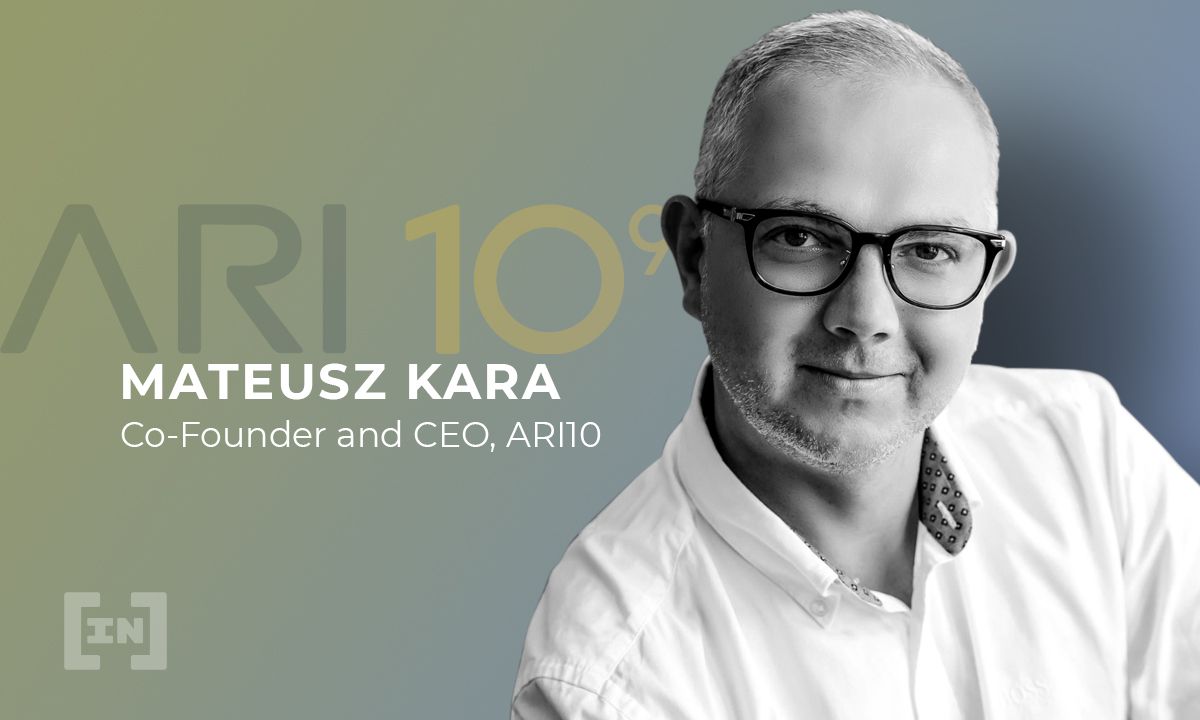BeinCrypto spoke to Mateusz Kara, a lecturer, and blockchain lawyer, about how a token and tokenization for businesses is the next big marketing tool.
Currently, there are plenty of projects in the cryptocurrency world with tokens. In fact, it is a utility used by most decentralized finance (DeFi) projects
Kara’s interest in cryptocurrencies and blockchain has resulted in him planning to launch a token for his business Arti10. However, he insists this isn’t simply a fundraising attempt.
“We are not doing this for money because our financial condition is very good,” says Kara.
Rather he sees it as the new modern marketing tool, moving beyond the success of traditional avenues.
Entering into crypto
BeInCrypto (BIC): Why did you get interested in blockchain and crypto in the first place?
Mateusz Kara (MK): I learned about cryptocurrencies when I was a lawyer at a publicly-traded company and I felt then that the traditional market was obsolete. When I was observing the first cryptocurrency bubble, I saw the first ICOs being created and I noticed the access to an unlimited market and people from all over the world. I realized this was a completely new approach to exchanges that would also move to traditional financial markets.
Time has proven me right.
BIC: When did you decide to work in the crypto market as a legal professional?
MK: While I was working as the head of the legal department at a listed company, I had a very clear comparison — how traditional exchanges work versus cryptocurrency exchanges. I knew exactly the limitations of traditional markets. I saw very quickly the opportunities offered by the crypto market. Access to capital and investors from all over the world are the most important ones. I was inspired by the cross-border nature and the lack of divisions. Everything seemed much simpler in the crypto market.
For these reasons, I got into cryptocurrencies and blockchain technology as a lawyer. The fact that this industry was still undeveloped in terms of law, tax, and accounting was appealing to me. So, we started developing my law firm as well as the Taxo Accounting Office.
We developed both the know-how and the technology for that. I think Taxo is one of the few accounting offices that has its own automated system for crypto settlements. Apart from that, thanks to my specialization in a growing niche, I became a lecturer at Collegium Da Vinci (a university in Poland). I teach cryptocurrency law.
Cryptocurrencies vs. traditional finance
BIC: What do you think the cryptocurrency market needs are?
MK: First of all, crypto-fiat exchange. Unfortunately, we still observe the reluctance of large financial institutions towards cryptocurrencies. It can be seen in a recent example of Binance. Note that it is much easier to create a crypto project such as DeFi, which does not have this transition to fiat.
Ari10 cooperates with third parties i.e. banks and payment service providers.
They have no mercy and make a very strict selection at the very start. This is the barrier that lots of projects do not pass.
From the very beginning, we are trying to match bank security standards, being a cryptocurrency company. This is a critical need to allow new capital and new investors to enter our industry. There are few companies that fill this gap.
The second thing is a business customer on-boarding to the crypto world. We address our offer primarily to large investors or institutions that have a need to invest in the crypto market. This is the type of client that requires comprehensive care. They need dedicated professionals and advice from the legal and tax perspective.
Many legal departments in big companies are wondering which side to enter the market from. We build for them a safe “bridge” between traditional finance and the new world of investments. We help them take their first steps and take care of their accounting. The companies working with us do not have to worry about anything and can feel safe in crypto investments.
Ari10: A simple start
BIC: What foundations have you built over the years to solve the problems you’ve just told us about? Earlier you mentioned Taxo.
MK: First of all, we have one product that is strictly related to cryptocurrency exchange — that’s our Bitcan exchange. Then we have two products that we specifically target B2B clients to help them monetize their experience (business relationships, website traffic). I mean our Cryptoterminals and BitcoinWidget. We give business partners the ability to set up their own exchange offices or implement widgets to purchase BTC on their websites.
On the other hand, we take on the most difficult task, which is the whole aspect of crypto-fiat swapping. This way we help to build businesses on a ready-made infrastructure. Additionally, we provide capital security. In general, our goal was to decrease the entry barrier to the minimum. And I think we have succeeded in that. We give know-how, we make sure our business partners are secure, we deliver products that make it really easy to get a good start in this business.
Why tokenize a business?
BIC: Why do you need tokenization if you have a good business already?
MK: For me, a token is just a modern marketing tool. I have seen it work many times on other projects in which I have been involved as a legal advisor.
I have observed how a token builds a loyal community around a particular brand. Such a community cares a lot and wants you to succeed because their financial success is related to the success of the company.
So for me, this is a way to build a strong group of Ari10 ambassadors to support us. In my opinion, a token is a much more effective tool for building an engaged community than traditional marketing. It’s certainly a different approach to tokenization than many other projects. Our main goal is to create a strong token. We are collecting quite a little capital for the stage of development we are currently in.
Our company is doing very well and would certainly do without token sales. In Poland, for these past four years, we have already built a pretty decent community. However, if we want to go out on a global scale we need a wider community. A token is a tool thanks to which we can go with our offer internationally.
Public sale will also give us an answer where it is worth taking the first steps abroad. We will see where the greatest interest in our services lies around the world. Where the need for Ari10 products is and if it is worth starting jurisdiction-related processes in a given place. It means that tokenization will also save us from doing artificial research.
It will allow us to enter into a dialogue with specific investors and customers. I look at the token more as our promoter and a research method than a way to finance our activities. Of course, the effect that we will have after the sale will also be financial. But after all, the token is supposed to give value to its buyers, and not just to finance our company.
We are planning neither a large supply nor a very large fundraiser, thanks to which we have achieved a very low initial market cap. This, in relation to the benefits of our staking program, should have a very positive impact on the value of the token after it goes public (listing). For us, the ideal win-win situation is when a person invests in a token and at the same time implements a widget or opens its exchange office with Cryptoterminal. I think that few companies share such an approach in the crypto business.
Focusing on B2B
BIC: Is there really no one else doing this in the market?
MK: What can I say… the companies that try to compete with us, operate in a different way. It’s also hard to call them our competitors. We are simply in the same business, but the methods and the focus of our activities are very different. Objectively speaking, other companies do not have such specialists or resources as we do.
I have been in the market for many years and I realize that it is very hard to find specialists who understand the needs of people in our industry. First of all, for business-to-business (B2B). I am aware that it’s a long-term process but we have already done it. I know that we are really the only ones who help big companies and institutions get into the crypto market safely. We don’t want to compete only on the B2C market, although we have a growing user base here as well.
On the other hand, we put full emphasis on large B2B customers, because we know that if we manage this space wisely, we will gain a huge advantage. And we know how to do it and we have all the resources to do it. I think that, in the long term, the one who manages this space can gain a lot.
Disclaimer
In compliance with the Trust Project guidelines, this opinion article presents the author’s perspective and may not necessarily reflect the views of BeInCrypto. BeInCrypto remains committed to transparent reporting and upholding the highest standards of journalism. Readers are advised to verify information independently and consult with a professional before making decisions based on this content. Please note that our Terms and Conditions, Privacy Policy, and Disclaimers have been updated.


